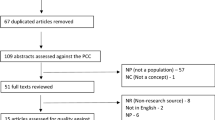Abstract
Objectives
The authors reviewed medical student encounters during 3 years of a required psychiatry clerkship that were recorded on a web-based system of six broad competency domains (similar to ACGME-recommended domains). These were used to determine diagnoses of patients seen, clinical skills practiced, and experiences in interpersonal and communications skills, professionalism, practice-based learning and improvement, and system-based practice. The authors aim to understand how students are learning and growing in these domains and to modify the clerkship in an ongoing manner.
Methods
Data were collected from the Dartmouth Medical Encounter Documentation System (DMEDS) for all student encounters in required third-year psychiatry clerkships during academic years 2004–2007, in which students had intensive involvement in patient care.
Results
One hundred seventy three students reported a total of 4,676 patient encounters, averaging 27.2 encounters per student and 1.8 psychiatric diagnoses per patient. Students met “learning targets” for anxiety disorder, bipolar affective disorder, depression, personality disorder (borderline), posttraumatic stress disorder, psychosis, schizophrenia, and substance abuse (alcohol), but not for disorders more likely seen in outpatient settings. For the 10 counseling skills learning targets, students only met those for family issues. In the four “newer” competency domains, students reported struggling with issues in 0.3% to 12.6% of encounters. Students documented being challenged by professionalism issues most often and recorded examples of how these competencies played out for them during the clerkship.
Conclusion
Use of a required web-based medical encounter reporting system for student-patient-faculty encounters during a psychiatry clerkship can be of significant value in assessing what students are seeing, doing, and learning on this required third-year experience. The results provide helpful current information to the clerkship director and data that help the director modify the clerkship on an ongoing basis to better meet students’ educational needs.
Similar content being viewed by others
References
Accreditation Standards, Liaison Committee on Medical Education 2007. Available at http://www.lcme.org/
Miller SI, Scully JH, Winstead DK: The evolution of core competencies in psychiatry. Acad Psychiatry 2003; 27: 128–130
Louie AK, Coverdale J, Roberts LW: Competency-based training: where will it lead us? Acad Psychiatry 2004; 28: 161–163
Bardes CL, Wenderoth S, Lemise R, et al: Specifying student-patient encounters, web-based case logs, and meeting standards of the Liaison Committee On Medical Education. Acad Med 2005; 80: 1127–1132
Denton GD, Williams RW, Pangara L: Core problems reported by students in a Palm OS and internet-based problem entry system predicts performance in third-year internal medicine clerkship. 2003, AMIA Annual Symposium Proceedings/AMIA Symposium
McVeigh S, Williams R, Pangara L: An internet home page to log students’ patient contacts. Acad Med 1997; 72: 417–418
Johnson VK, Michener JL: Tracking medical students’ clinical experiences with a computerized medical record system. Fam Med 1994; 26: 425–427
Carney PA, Pipas PF, Eliassen MS, et al: An encounter-based analysis of the nature of teaching and learning in a 3rd year medical school clerkship. Teach Learn Med 2000; 1221–1227
Pipas PF, Carney PA, Eliassen MS, et al: Development of a handheld computer documentation system to enhance an integrated primary care clerkship. Acad Med 2002; 77: 600–609
Carney PA, Pipas PF, Eliassen MS, et al: An analysis of students’ clinical experience in an integrated primary care clerkship. Acad Med 2002; 77: 681–687
Rattner SL, Louis DZ, Rabinowitz C, et al: Documenting and comparing medical students’ clinical experiences. JAMA 2001; 286: 1035–1040
Withy K: An inexpensive patient-encounter log. Acad Med 2001; 76: 860–862
Roberts L: Sequential assessment of medical student competence with respect to professional attitudes, values and ethics. Acad Med 1997; 72: 428–429
Jarvis RM, O’Sullivan PS, McClain T, et al: Can one portfolio measure the six ACGME general competencies? Acad Psychiatry 2004; 28: 190–196
Phelan S, Obenshain SS, Galey WR: Evaluation of the non-cognitive professional traits of medical students. Acad Med 1993; 68: 799–803
Papadakis MA, Loeser H, Healy K: Early detection and evaluation of professionalism deficiencies in medical students: one school’s approach. Acad Med 2001; 76: 1100–1106
Bienenfield D, Klyklyo W, Knapp V: Process and product: development of competency-based measures for psychiatry residency. Acad Psychiatry 2000; 24: 68–76
Bienenfield D, Klyklyo W, Lehrer D: Closing the loop: assessing the effectiveness of psychiatric competency measures. Acad Psychiatry 2003; 27: 131–135
Swick S, Hall S, Beresin E: Assessing the ACGME competencies in psychiatry training programs. Acad Psychiatry 2006; 30: 330–351
Carney PA, Eliassen M, Scottie MS, et al: Ambulatory care education: how do academic medical centers, affiliated residency training sites, and community-based practices compare? Acad Med 2004; 79: 69–77
Pary RJ, Becker SL: Determining, monitoring and verifying patient-student involvement (ED-2) in a psychiatry clerkship: preliminary findings. Acad Psychiatry 2006; 30: 397–402
Nierenberg DW, Eliassen MS, McAllister SB, et al: A web-based system for students to document their experiences within six core competency domains during all clinical clerkships. Acad Med 2007: 82: 51–57
Narrow WE, Rae DS, Robins LN, et al: Revised prevalence estimates of mental disorders in the United States: using a clinical significance criterion to reconcile two surveys’ estimates. Arch Gen Psychiatry 2002; 59: 115–123
Robins LN, Heizer JE, Weissman MM, et al: Lifetime prevalence of specific psychiatric disorders in three sites. Arch Gen Psychiatry 1984; 41: 949–958
ADMSEP LCME Task Force: Results of ED2 adherence in 10 medical schools. Presented at Annual Meeting of the Association of Directors of Medical Student Education in Psychiatry, Park City, Utah, June 22, 2007
Author information
Authors and Affiliations
Corresponding author
Additional information
At the time of submission, the authors declared no competing interests.
Rights and permissions
About this article
Cite this article
West, D.A., Nierenberg, D.W. Student Experiences with Competency Domains During a Psychiatry Clerkship. Acad Psychiatry 33, 204–211 (2009). https://doi.org/10.1176/appi.ap.33.3.204
Received:
Revised:
Accepted:
Published:
Issue Date:
DOI: https://doi.org/10.1176/appi.ap.33.3.204



